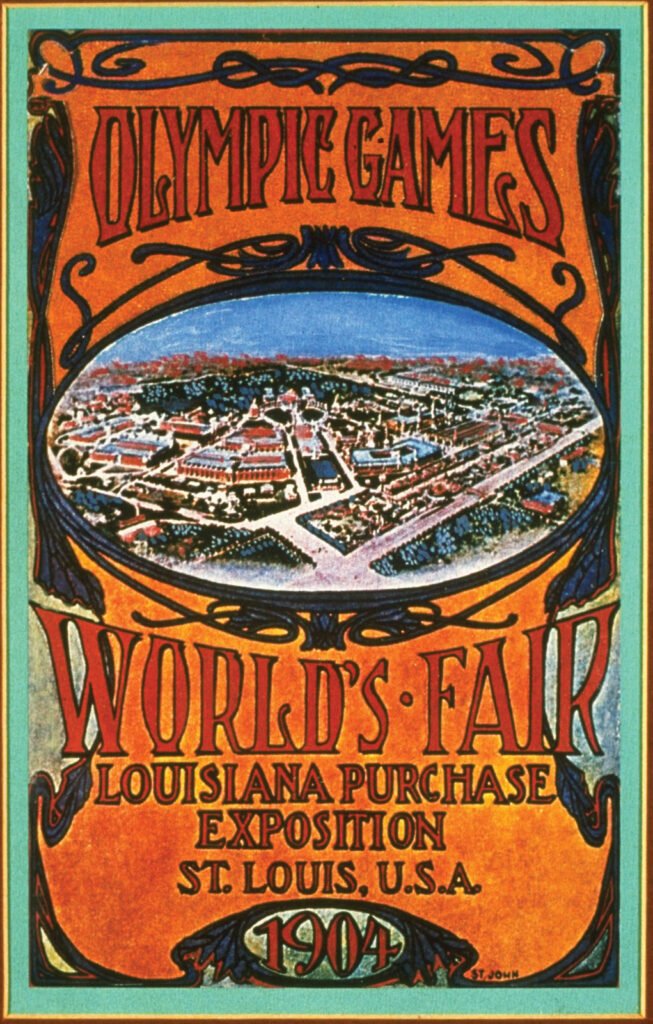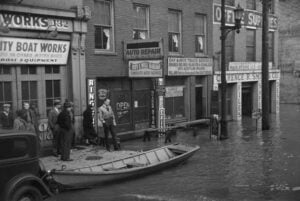When St. Louis hosted the most bizarre race in Olympic History.
Hasty organizing, pseudoscientific beliefs, and international irreverence turned the 146-day Olympic games into one of the most bizarre sporting events in modern history, culminating in an unimaginable marathon on a 90-degree day.

In 1904, St. Louis hosted the Summer Olympics, to coincide with the upcoming World’s Fair located in the city’s Forest Park. Hasty organizing, pseudoscientific beliefs, and international irreverence turned the 146-day games into one of the most bizarre sporting events in modern history, culminating in an unimaginable marathon.
St. Louis is awarded the 1904 Olympics
St. Louis wasn’t destined to host the 1904 Olympics. After the World’s Fair Committee refused to have Chicago host the Olympics during the World’s Fair, Chicago was stripped of its plans, and the Olympics were moved to St. Louis, where the World’s Fair commemorating the anniversary of the Louisiana Purchase was held.
Pierre de Coubertin wasn’t the only one to decline the invitation. The vast majority of the world’s top athletes refused to travel to St. Louis. Most of the athletes were American, hence why the United States won 239 medals.
Other events included swimming events in cattle-wading ponds, tug-of-war, and an infamous marathon.
Also, read about the blatant racism of the 1904 games.
The Marathon:
The 26.1-mile marathon started at Francis Field, which stills exists at Washington University. Dust blanketed the windy roads, while the swampy 90-degree heat and humidity added to the hellish course. The course went over seven steep hills.
The competitors were followed by an entourage of doctors, judges, and reporters in newly invented automobiles. The resulting walls of dust made it difficult for the competitors to see or breathe.
It also didn’t help, that the competitors only had one chance to hydrate themselves a third of the way into the race. The organizer of the event wanted a scientific test to see how long competitors could go without water. St. Louis’ water treatment, though revolutionary, wasn’t up to par, which gave competitors intestinal issues.
The marathon wasn’t short on interesting characters.
Felix Carvajal, a Cuban postman, reached New Orleans with the intent of competing in the 1904 Olympics. While in New Orleans he lost his money in a crap game and had to hitchhike up to St. Louis.
Felix Carvajal showed up minutes before the race. He hadn’t slept for 40 hours and ate barely anything.
He wore wool trousers and dress shoes. The judges postponed the race for a few minutes so the 95-pound Cuban could cut off his trousers.
Carvajal started out the race well. Spectators conversed with him in English while he ran backward and gleefully responded in broken English. However, after stealing a peach from an attendant, he stopped by an apple orchard, plucked a green apple from the tree, ate it and went on his way. Either the apple or the peach was bad, and Carvajal keeled over with stomach aches and took a nap on the side of the road.
Felix managed to finish in fourth place.
Some historians say the Carvajal stories may have been exaggerated.
The Winner(s)
Fred Lorz from New York City, was the first person to cross the finish line. With a smug expression on his face, he waved at the cheering throngs of spectators. Photographers snapped their cameras, and President Theodore Roosevelt’s daughter Alice, greeted him, placing a victory laurel on his head.
Minutes before Lorz could accept his gold medal, race officials were informed about Lorz’s scheme. Nine miles into the race, Lorz, suffering from stomach cramps, hitched a ride on an automobile for 11 miles until the vehicle broke down. He hopped out of the truck and finished the remaining race.
When officials confronted him, Lorz said it was a joke and he intended to let them know. The annoyed Olympic officials banned him for life.
Years later, Lorz won the Boston Marathon.
The real winner, British-born Thomas Hicks, ran for the American team. He stumbled across the finish line. His legs wobbled and he mumbled to his assistants, believing he was 20 miles away from the finish line.
His assistants held him up and led him across the finish line. The crowd reluctantly cheered, and Alice Roosevelt walked over to award him a wreath. But he collapsed, and it took four doctors to prevent him from dying.
Ten miles before he reached the finish line, he begged his trainers to sit down and let him drop out of the race. His trainers instead handed him “the white of an egg” and a few doses of strychnine – a devastating poison used to kill small rodents and birds. (Basically rat poison). Along the route, he was handed brandy, which didn’t help with the dehydration.
The marathon was also notable for having the first African runners. Lentauw, a Zulu tribesman, had a solid chance of winning the marathon before he was chased a mile off course by an angry dog.
Legacy
Unsurprisingly, the marathon was condemned. The Olympics committee wanted to ban the event indefinitely.
The St. Louis Olympics games were such a disaster, it embarrassed the Olympic Committee into hosting interim Olympic games two years later in Athens, hoping to revive the failing Olympic movement.
While the 1904 Olympics were a failure, the 1904 St. Louis World’s Fair, left a lasting impression on the world. Groundbreaking innovations were unveiled including the X-ray machine, the electric streetcar, and the waffle-style, ice cream cone. Thank god for the ice cream cone.








1 thought on “When St. Louis hosted the most bizarre race in Olympic History.”